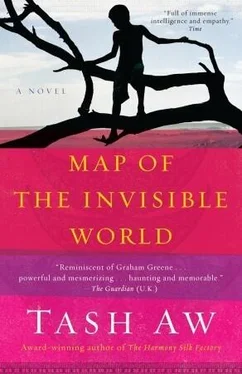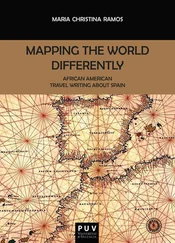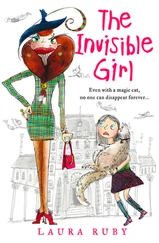“That’s a very touching parable, but how does it help us at this particular point in time?”
“That parable , as you call it, really happened. And when that fat, angry file comes through from Washington demanding answers, where do you think it ends up? Right here.” He tapped his fingers on his desk. “I have to deal with so much crap, you wouldn’t believe it. Why do you think I’m going to bust my balls to find one white guy who’s probably on his way back to a cozy house in The Hague with a log fire and furry slippers and a nice, big-assed wife?”
“Because you know that I can do something for you in return. That’s why you gave me the newspaper clipping.” Bill Schneider leaned back in his chair. The rattling of the air conditioner had stopped. Out of the corner of her eye Margaret noticed that Mick was picking the label off his beer bottle, peeling the wet paper off in bits. “That’s very,” Bill began, “very mercenary of you.” The sides of his mouth (Margaret thought) grew taut, as if he was trying to stifle a smile of satisfaction.
“Cut the bull, it’s what you want.”
“What ever happened to old-fashioned patriotism? Shouldn’t Americans help each other out in times of distress?”
“If you help us find our friend, I’ll do whatever I can to help you in your sordid machinations. That’s the deal, isn’t it, Bill? It always is with you.”
“Your idea of sordid isn’t the same as the rest of the world’s, Margaret. You’re like a dinosaur, trapped in a lost world.”
“It’s quite nice in my world, thank you very much.”
“Don’t worry — I’m not going to ask you to do anything you’re not comfortable with this time.”
Margaret stood up. “I’m sure you’ll be in touch. Our friend’s name is Karl de Willigen.”
Bill Schneider said, “I know.”
They drove through the gates, honking to disperse the mob. The mood had changed: The students were closer to the barricades in front of the entrance and were chanting and shouting more loudly. There were more soldiers too, standing close together with their rifles cradled against their chests. Something landed with a hollow thud on the roof of the car: a dirty canvas shoe. It rolled down the windshield before settling on the hood in front of Margaret. Mick revved the engine as they inched through the crowd; people were hitting the car, slapping the windows with their bare palms, and every so often the door handles would snap noisily as someone tried to open the doors. Mick accelerated now and then, just a bit; the staccato jerking of the car would clear a space in front of them before the bodies closed in once more. Margaret looked straight ahead, avoiding the gazes of the faces pressed against the windows.
“Traffic’s bad today, isn’t it?” Mick said. He sounded cheery, but Margaret easily discerned the note of anxiety in his voice. He reached for the radio and flicked it on. “If you’re fond of sand dunes and salty air …” the voice crooned, “you’re sure to fall in love with old Cape Cod.”
“These guys look as if they’re high on drugs,” she said.
“The only thing they’re high on is Sukarno’s revolution. They know they want change, but they haven’t got a clue how they want to achieve it. Don’t worry, they’re just students — you’ve probably taught most of them.”
“… if you like the taste of lobster stew served by a window with an ocean view …”
They broke free from the last of the demonstrators and slipped away like a boat freeing itself from a shallow shore, escaping into deep water.
“What did Bill Schneider mean by ‘this time’?” Mick asked as they joined the sea of cars and becaks and trucks.
“… you’re sure to fall in love with old Cape Cod …”
“What did he mean by what?”
“ This time . He said he wouldn’t ask you to do anything you didn’t want to— this time.”
“Did he? I wasn’t paying attention.”
“What happened last time?”
“I don’t have a clue.”
“‘It’s the nonverbal communication that forms the basis of society.’ What do you think you’re communicating now?” They had come to a halt in the traffic. A young boy, shirtless and barefoot, wearing a dirty pair of maroon shorts, pressed a newspaper against the window and held out one hand for money.
“Nothing — especially since I don’t know what you’re getting at.”
“You’re twirling your hair and fiddling with your nose, and only just resisting the urge to bite your fingernails because you know I’ll notice it. And you’re frowning as if you’re confused. I’d say you were communicating the fact that you’re lying. Doesn’t take a fucking anthropologist to work that one out.”
“Bill Schneider said a lot of things — I can’t recall every single detail. Besides, he’s not exactly Chekhov when it comes to choosing his words, in case you hadn’t noticed.” She was feeling very hot; the windows were still closed and she began to think that even the choking Jakarta air would be better than the stifling heat of the car. “Can we turn this godforsaken music off?” She reached for the dashboard and fiddled with the knobs, but nothing worked.
“Whatever he is, he isn’t a fool. So, you worked for the CIA? How fantastic! You never told me.”
“Even you know how ridiculous that sounds.”
“Not as ridiculous as your denials. It’s obvious you were thick as thieves with Bill Schneider. Come on, what did he have you do? Was it … sexual?”
“One day when you’re in a less immature mood I will tell you all about my very limited involvement with Bill.”
“That had better be soon, otherwise you can ask him and not me to drive you around town.”
The Jakarta sky was a murky ocher color, a blank canvas of yellow brown haze. If you stared at it long enough it glowed, faintly but definitely, becoming phosphorescent like a neon bulb. From behind this curtain of smog the sun cast a light that did not seem real; every thing in this city looked uncertain, imprecise “… if you spend an evening you’ll want to stay watching the moonlight on Cape Cod Bay….” Margaret continued to gaze at the sky. She rolled down the window and felt the rush of hot air against her face, and, before long, the dust and grit on her lips and tongue. She could not make out where roads merged or stopped, or where the buildings began and ended. There was only the iridescent sky above her.
* * *
Go on, take this .
There were no lights where they were. The city glowed faintly in the distance but they were beyond its grasp now. The car lay on the muddy road flanked by rows of bushes leading deeper into the palm oil estate. Johan reached for Bob’s outstretched hand. He could just about make out a dark square on the paler background of Bob’s palm. It was a piece of paper, but he could not tell what color it was. He lifted it with his fingertips and put it in his mouth and then took a sip of whiskey from the hip flask he had with him.
Thanks, Bob.
Anytime, Brother.
The shapes of the darkened bushes around them seemed to swell like rain clouds on a December afternoon. Now and then a car would drive by on the main road and its headlights would sweep past, filtering through the foliage in a burst of white light before leaving them alone in the dark once more.
Not again, for god’s sake, Farah said. You said we were going to the movies tonight, you said we were just going to have a nice, quiet evening.
We are, Johan said. Everything’s … quiet. Okay, we’re going home. Enough of this. Hey, Sis, Bob said. Just take some of this and you’ll feel better. Where the hell do you two get this stuff? Johan shrugged. All over. Anywhere. Don’t lie to me. I don’t see it when I’m walking down the street. Who gives it to you?
Читать дальше
Конец ознакомительного отрывка
Купить книгу












